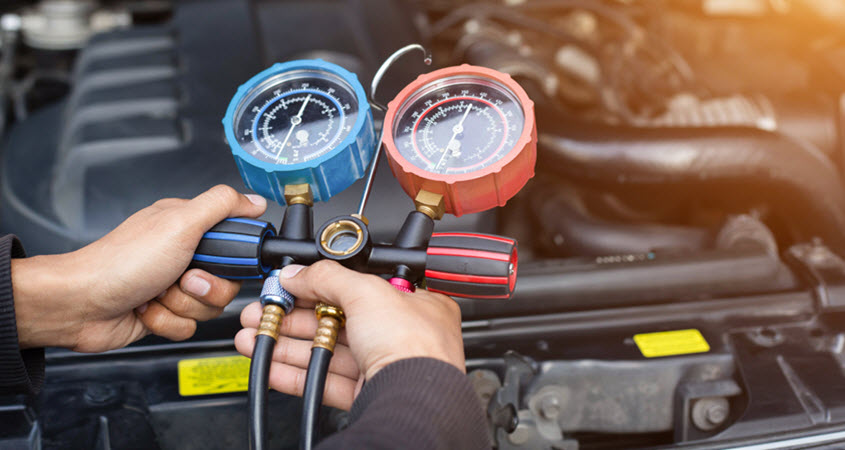Your BMW air conditioning unit provides a pleasant atmosphere within your BMW’s cabin. The unit has a lengthy lifespan but requires the replacement of the refrigerant every two years, provided there is no leakage. Hence, it needs regular maintenance to keep it in excellent working condition.
Contrary to popular beliefs, your BMW air conditioner does not generate cold air. Instead, it converts hot air to cold air. It does this by either altering the cabin air or bringing it in from outside. Keep reading as we discuss how your BMW air conditioning unit works and the symptoms indicative of its failure.
How does a BMW’s air conditioner work?
The system uses a compressor to increase the pressure of a refrigerant to lower its volume. When the pressure rises, the temperature rises with it. This hot air is now sent to the condenser, where it loses temperature while maintaining the same pressure when the air passes through it.
As a result, the air becomes a liquid. The liquid is now sent through a drier, which separates the liquid from any residual air. The liquid then passes through a thermal expansion valve, which converts your hot, high-pressure liquid to a cool, low-pressure form of air. The cold air is now forced to flow through an evaporator.
The evaporator then passes hot air from outside your cabin. The hot air loses its heat when it comes into touch with the cold air, and you get cold, pleasant air that has been conditioned and blown through your vents. The cold air from the evaporator then returns to the compressor, recreating the cycle to keep you comfortable.
The Importance of Maintaining Your BMW’s Air Conditioning System
The smooth running of your BMW air conditioner hinges on how well you maintain it. Besides providing a safe driving environment, it also helps clear up condensation or humidity that may build up on the windows during the winter or cold weather.
Discussed below are symptoms of a broken air conditioning unit:
- Odd compressor noise: The compressor is driven by a belt that runs off the engine crankshaft. It is responsible for generating power and directs airflow through the vents. The compressor comprises several internal, including ball bearings and coils. The failure of any of these components could cause a squeaking or grinding noise, explaining the unusual noise from the compressor’s operation.
- Hot air from the vents: The failure of any of the components that make up the unit will ultimately cause it to fail. Oftentimes, the issue may result from a broken condenser or faulty compressor, which affects the effective cooling of the air extracted from the vehicle cabin.
- Failed air conditioner condenser fan: The system’s condenser fan keeps the condenser cool for the efficient operation of the air conditioner. You’ll notice straight away if the fan fails because it affects cool air circulation. Aside from the release of warm air from the vent, you may also notice a burning smell and overheating.
- Leaky Air Conditioner: The probability of you noticing this symptom is very slim, but the possibility still exists. A refrigerant circulates through the system to transfer the heat as it changes from the liquid to gas state. A compromise in the unit would leave room for the refrigerant to escape from the system. The compromise could be a failed O-ring or other seals, resulting in a hissing sound.

Kruse Lucas Imports for all Your BMW Maintenance and Repairs
If your BMW air conditioning unit isn’t effective as it used to be, and you live in Modesto, CA, bring it to us at Kruse Lucas Imports. We are equipped with the latest factory tools and provide high-quality BMW repair and maintenance for all our customers!
At Kruse Lucas Imports, we only employ expert and certified technicians who have built a reputation for providing dependable, high-quality services for European vehicles. If you reside in the surrounding areas of Manteca, Oakdale, Ripon, or Turlock, please call or visit our shop today! We look forward to earning your repeat business for all your future BMW needs and services.
 525 Tully Road
525 Tully Road (209) 529-9111
(209) 529-9111

